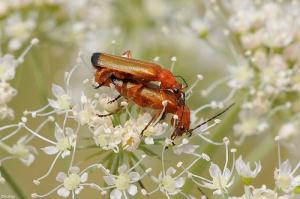
For females, sex can be a dangerous activity in many species (and I’m not talking about social dramas experienced with humans!) For example, in some invertebrates the male will pierce the female’s abdomen and inject sperm through the wound at the female’s own detriment (in process termed hypodermic insemination) or the danger posed by a serious love bite from an over amorous shark!
Research led by Professor Matthew Gage has shown that despite the dangers of mating in some species, the promiscuity of females will increase during certain conditions, triggering them to mate with several males. Professor Gage’s team focused on the mating of the driving flour beetle (Tribolium castaneum).
Reducing the number of individuals within a controlled population artificially created an inbred population. As numbers decreased, the potential mating partners started to dwindle. In a bid to avoid fertilisation with any close relatives, female T. castaneum actively bred with as many males as possible to ensure the genetic viability of her offspring.
Perhaps unsurprisingly, the most promiscuous females produced the largest number of offspring and consequently, aided the survival of their own genes. Professor Gage proposed the females stored a pool of sperm from each individual male to screen for the least genetically similar breeding partner.
This is an incredible evolutionary solution to environmental pressures and helps to explain why females of some species are extremely promiscuous despite the costs to their own health.
By Haley Dolton

